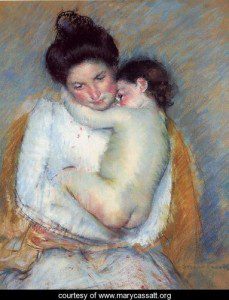I never met my grandmother. I only have stories about her, and just a very few at that. My mother kept her mother and her memories to herself, for the most part. Sometimes I could pry a story or two out of Mom, if I asked the right question, but when I could have asked, I wasn’t all that curious. Why would I care about a woman I’d never met? Children can be very out-of-sight-out-of-mind sort of people; immediacy and immaturity can have a lot in common besides the first three letters.
These stories, told perhaps only once in a spacious moment shared with my mom, have now become my own memories. Sometimes I bring out the few images I have, like mementos from an old box, and spread them out, poring over them for some clues, some hint to my true self’s spiritual or physical genetics. I handle them very carefully because they are precious and fragile, and so here I write about them with gentleness. I hope you can read them the same way.
I remember the time Mom, a young teenager, begged her mother for permission to paint her fingernails. Shocking. Alberta was, um, well, conservative—politically, socially, theologically, and any other -ly you can think of. She had sent Mom to a fundamentalist boarding school six states away when she was 14 years old just in the hope of shaping a sheltered and saved woman of virtue.
Perhaps you will roll your eyes at the rigidity of her moral boundaries. Perhaps you will sneer at her narrow-minded understanding of life and purpose. Yet from all accounts, Alberta was also a deeply spiritual and complex woman—prayerful, faithful, loving, and kind. A caring mother, a steadfast wife, a hardworking member of her church, a student of the scriptures, and someone who would have been courteous to all who crossed her path.
But fingernail polish? Never. Along with a whole list of other nevers: playing cards, movies, dancing, smoking, alcohol, theater, and “worldly” novels. How Alberta managed to live with her three-husband-whisky-drinking-ear-piercing mother, I’ll never know. There are a lot of spiritual genes there to reconcile. It’s taking me a lifetime.
How Mom convinced her to let her paint her nails … red, no less … and then persuaded Alberta to paint her own nails is beyond me. Some mother-daughter mystery going on there. Nevertheless they did. A moment of moral weakness, I guess.
Then they got loopy, careless, profligate even. They went downtown together and, of course, as they walked down the street whom should they see walking toward them but a fellow church member. Lord, have mercy! Both women thrust their hands behind their backs, clenching fists to hide their sin. I don’t know if later they laughed or cried about the calamity.
Another memory. My mother, five months pregnant with me, sitting by my grandmother’s hospital bed, watching her die an ugly death at the age of 54. A haunted death that was tortured by a dark secret nearly 30 years old.
Whatever sins of commission or omission Alberta may have committed were largely forgotten as she lay there preparing to meet her Maker. Only one choice tormented her, an accumulated agony of three decades over a single act of desperation. My grandmother, facing the fears and impossibilities of Depression-era poverty, had had an abortion. She wasn’t single; she wasn’t “wanton”; she wasn’t faithless. She was afraid. She exchanged that burden of fear for a lifetime of guilt and shame.
I’m not making a statement about abortion here. This blog isn’t about that. It’s just a recognition that my grandmother made a choice, lost a child, and never recovered from that. Whatever exchange she made was not a good one, for the remainder of her life was weighed down with grief. The life she terminated was not just that of the fetus, but was in many respects her own.
Is there a moral to this story? Some would like to conclude that the real problem here is not the choice; it’s the onerous fundamentalist morality that generated the guilty conscience. Others would like to talk about the poverty that made her choice “necessary.” I’m not sure the meaning of this story lies in the context—moral or social. Nor does it lie in some propositional statement about good and evil, right or wrong, true as those things may be.
This is a story of a woman’s mother’s mother. And though not told here, it is also the story of a father who bore the ignominy of not being able to provide enough security; of a daughter who could not replace a missing child; even of unnamed friends who could not understand years of depression. And who now can tell the stories that never happened? Who now can fill in the “missing person report” with descriptions of eye color, timbre of voice, stature, quality of laugh, gesture, and loves?
Somehow the meaning of the story is simply that of the woman herself and the long reach of her choice.
-KMulhern












